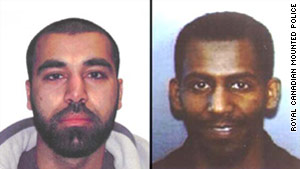By Erica Laster Impunity Watch Reporter, North America
TORONTO, Canada – Two Canadian fugitives are now facing conspiracy, instruction and training to carry out terrorist activity charges in Canada, authorities announced at a news conference in Winnipeg Tuesday. Two of three other New York co-conspirators, including one, Najibullah Zazi, pled guilty to the bombing attempt carried out on behalf of al Qaeda in 2009. Maiwand Yar and FeridImam are now the subjects of an international manhunt which some believe includes the CIA.

A former student at the University of Manitoba, Imam, 30, has been identified as a weapons instructor known as “Youseff.”
Authorities indicated that both Imam and Yar left Canada for Pakistan in 2007. Authorities believe they planned to receive training in scouting, the use of firearms, guerrilla warfare and the use of explosives. Their goal was to join insurgents in committing terrorist attacks on NATO forces currently stationed in Afghanistan.
Royal Canadian Mounted Police assistant commissioner Bill Robinson indicated that “This extensive and thorough national security investigation has provided us with the evidence we require to lay criminal charges.”
A second indictment from the Eastern District of New York, unsealed on Tuesday, revealed charges that Imam received military training from al Qaedasubjects and provided material support to the known terrorist group “including currency, lodging, training, safehouses, communications equipment, personnel and transportation.”
Imam is also accused of training the three New Yorkers involved and caught in the New York City plot. Authorities further believe that in 2008, Najibullah Zazi, Zarein Ahmedzay and Adis Medunjanin were trained and supported by Imam during a trip to northern Pakistan. The three former high school classmates returned to the United States with orders from al-Qaeda to commit terrorist attacks in the United States, specifically as suicide bombers.
At the command of al-Qaeda leaders, Zazi, an airport driver from Denver, traveled to New York to carry out orders in 2009. He was later arrested after fleeing to Colorado. Zazi and Ahmedzay pled guilty to all charges while Medunjanin alone has pled not guilty.
Unable to locate and arrest the two missing fugitives, Canadian authorities charged Zaxi and Yar, issuing their indictment in absentia. “We continue to work with Canadian border services and domestic and international security partners on this matter,” says assistant commissioner Robinson.
Gilles Michaud, a second commissioner of the RCMP acknowledged that authorities have no credible leads regarding the fugitives’ locations. “There’s been no proof of life for more than a year,” he stated.
Canadian authorities and counter-terrorismofficials have become increasingly concerned about the radicalization of such men from North America and Europe. “There is no set criteria. It affects all walks of life. These were well-educated, young individuals with no past criminal history and supportive families,” Michaud stated.
The investigation is ongoing.
For More Information Please Visit
CNN – Canadians Facing Terror Charges in 2009 N.Y. Subway Plot – 15 March 2011
Washington Post – Canadian Fugitive Charged With Foiled Al-Qaida Plot Vs NYC Subways; More Charges In Canada – 15 March 2011
Toronto Sun – Ex-Winnipeggers Accused of Terrorism – 15 March 2011
Huffington Post – Ferid Imam, Canadian Fugitive Charged In NYC Subway Plot –
